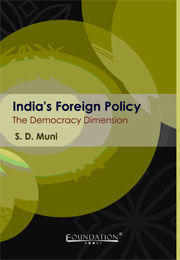Book contents
- Frontmatter
- Contents
- Preface
- 1 Introduction
- 2 The Nehruvian Phase: Ideology Adjusts with Realpolitik
- 3 Nehru's Successors: Realism Takes Command
- 4 Imperatives of the New Millennium
- 5 An Overview
- Appendix I Warsaw Declaration on Community of Democracies, June 2000
- Appendix II Santiago Commitment; Community of Democracies, April 2005
- Appendix III PM's Address to Joint Session of the US Congress, July 2005
- Appendix IV PM's Speech at the Foundation Stone Laying Ceremony of Afghan Parliament, August 2005
- Appendix V PM's Speech at the UN Democracy Fund, September 2005
- Appendix VI PM's Speech at the Conference on Democracy, Development and Social Inclusion, December 2005
- Index
Appendix VI - PM's Speech at the Conference on Democracy, Development and Social Inclusion, December 2005
Published online by Cambridge University Press: 26 October 2011
- Frontmatter
- Contents
- Preface
- 1 Introduction
- 2 The Nehruvian Phase: Ideology Adjusts with Realpolitik
- 3 Nehru's Successors: Realism Takes Command
- 4 Imperatives of the New Millennium
- 5 An Overview
- Appendix I Warsaw Declaration on Community of Democracies, June 2000
- Appendix II Santiago Commitment; Community of Democracies, April 2005
- Appendix III PM's Address to Joint Session of the US Congress, July 2005
- Appendix IV PM's Speech at the Foundation Stone Laying Ceremony of Afghan Parliament, August 2005
- Appendix V PM's Speech at the UN Democracy Fund, September 2005
- Appendix VI PM's Speech at the Conference on Democracy, Development and Social Inclusion, December 2005
- Index
Summary
I am delighted to be here today to inaugurate this “Conference on Democracy, Development and Social Inclusion”. I welcome the initiative taken by Dainik Jagran, one of our foremost Hindi dailies. I commend the publishers and the journalists associated with Dainik Jagran for the mark they have made in Indian journalism.
One of the most important aspects of our development process in the past two decades has been the impressive growth of the Indian language media, both print and television. This is testimony to the spread of literacy, and the rising political and social consciousness of the Indian people. It has contributed to the strengthening of our democratic processes and institutions. It has also benefited our development process, contributing to greater social inclusion. This explosive expansion of Indian language media has helped bring issues of development and empowerment onto the forefront of the national political agenda.
Ours has truly been a unique experiment in nation building. Initially, in the 1950s, that debate seemed to go in our favour, as democratic India did rather well in terms of development. As a doctoral student in the late 1950s, I recall many western scholars describing India as a ray of hope and a successful laboratory for combining both democracy and development. Regrettably, however, the 1960s were a lost decade for us. Three wars, severe drought, a balance of payments crisis and a series of political agitations disrupted the growth process.
- Type
- Chapter
- Information
- India's Foreign PolicyThe Democracy Dimension, pp. 171 - 174Publisher: Foundation BooksPrint publication year: 2009



